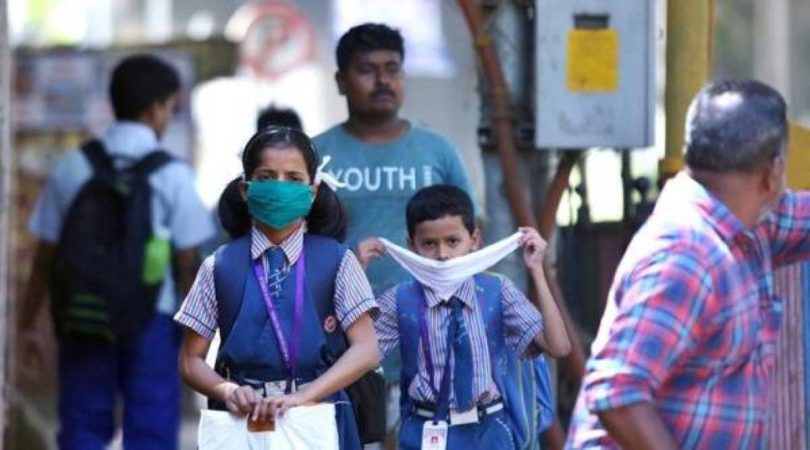[ad_1]
This year when schools reopened in July after being shut due to the Covid pandemic, I noticed a seven-year-old girl in my family was carrying a very heavy bag for her age. To humour her, I asked her what she was carrying apart from her books. She replied, only textbooks and notebooks. I overlooked her reply and ascribed it to her enthusiasm for returning to school. But even after a month, her bags’ size and weight remained the same. I inquired further but every household’s story remained the same.
After the pandemic, things have changed a lot in schools. Sanitisers and masks have become a part of a child’s life. They also carry heavy bags which causes mental and physical burden. I have tried to discuss it with many teachers and administrators but am yet to understand why such a heavy bag is needed for a child. The memories of our school times are tied with many incidents, many of which are about playing, enjoying and learning. Still, the bag always seems to put its heavy weight on those memories because heavy bags are always tied with fear, punishment and book-based curriculum, which put unnecessary pressure on a child’s health.
In 1993, a committee called “Learning without burden” was formed under the chairmanship of Yashpal. It spoke in detail about the increasing burden of bags and expressed concern over the issue. It suggested changes in the syllabus to reduce the weight of bags. The committee also suggested how to make learning joyful and give less emphasis on books and bags for children.
Other committees have also made suggestions on this issue and some improvements have been made in the curriculum. But our education system is yet to fully internalise them as the weight of the children’s bags is not changing.
Irrespective of which school it is, how high the fee is or how qualified the teachers are, at the end of the day, the thinking of all the schools and teachers continues to remain that maximum education can be obtained only by carrying more books. It is still a stereotype that whoever carries more books and notebooks will automatically become more knowledgeable.
Therefore, it becomes compulsory for students to bring all books and copies in the bag every day. Instead of finding new ways of teaching and learning, schools and teachers are paying more attention to technical and materialistic things like apps, books and bags. People need to understand that the teaching method is more important than books or other tools. No matter how much theoretical knowledge teachers have, if they cannot teach it to the child, then it is in vain. In recent times, efforts have been made to improve school education.
If the classroom environment is to be made interesting, then children should be taught in small groups. It means the size of the class will have to be reduced. But that implies that the number of classes will have to be increased which will require more teachers. For this, we require more qualified teachers who can not only understand the child’s state of mind but who can also implement the curriculum accordingly. The Right to Education Bill had called for reducing the classroom size. But after so many years, the size of the classes across the state has remained the same.
The question is whether we have teachers with sufficient skills to solve this problem. We know that the question is complex, as we need to get more qualified teachers who understand the curriculum and the child’s mind. The number of quality teachers depends on whether our universities/colleges can provide good teachers. To find a solution, we must search for answers around us.
The National Council for Teacher Training (NCTE), under the central government, has the task of setting the minimum qualifications for teachers, preparing curriculum and facilitating the opening of new colleges for teacher training. But, the work of selecting and recruiting the teachers lies with the state government. This system is good if you want to appreciate the federal structure. Still, suppose you are really upset with the quality of the school and teachers. In that case, you should understand why our education system is not improving even after many efforts because education falls on the concurrent list. No one wants to take responsibility for improving it.
The burden of the bag tells stories of the failure of our educational system. It tells us that teachers are not able to teach our children without books. It also tells us about teacher training institutes; that even after so many years, they cannot produce skilled teachers who can reduce the burden of bags.
The new National Curriculum Framework (foundational stage) is a very progressive document that talks beyond the classrooms. The document focuses more on pedagogy than content and encourages activities. It asks educators to use crafts, music, toys, local stories and notes the importance of the child’s mother tongue. It discourages examinations and puts more emphasis on observational assessment. It talks about systematic change in light of NEP-2020. It acknowledges the importance of the teacher, students and other stakeholders. The new NCF is a very important document and can change India’s educational landscape if it is implemented in its spirit. This document’s main challenge is preparing the state government and teachers for its implementation. There is a need to accept some positive aspects of educational changes in the states without any political consideration.
The writer is Director, Center of Policy Research and Governance and is presently a member of the National Focus Group on Teacher Education constituted by NCERT
[ad_2]
Source link








